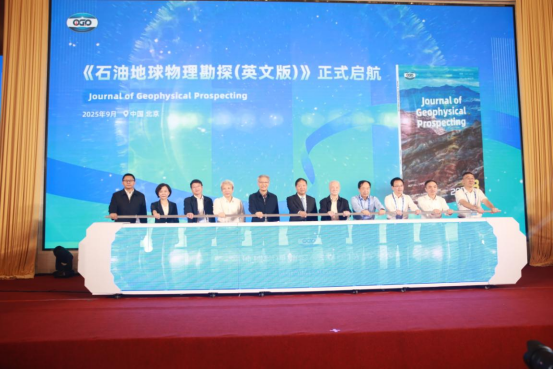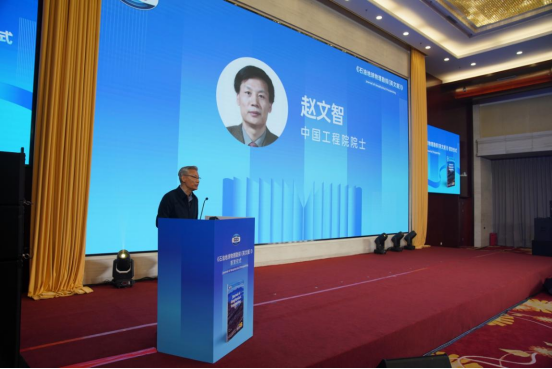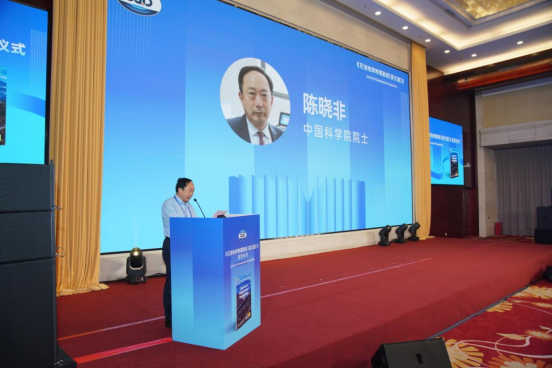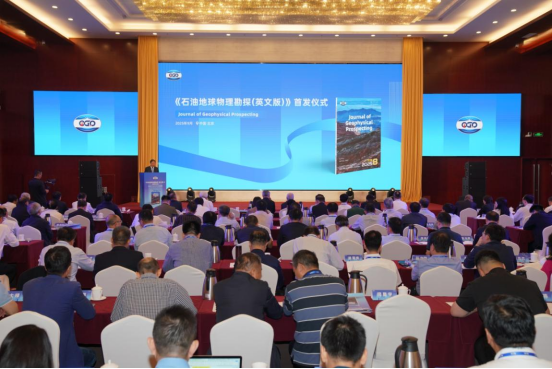
ISSN 2097-6518
CN 13-1442/TE
CN 13-1442/TE
The launch ceremony for the Journal of Geophysical Prospecting (JGP) — the English edition of Oil Geophysical Prospecting — was held at the Petroleum Science & Technology Communication Center in Changping, Beijing. The event marks the journal's establishment as the first Chinese-English bilingual journal in China's geophysical field and signifies a milestone step for BGP in promoting the global dissemination of Chinese geophysical academic achievements.

The new journal was officially launched globally via a laver-launch ceremony attended by: Teng Jiwen, Academician of the Chinese Academy of Sciences (CAS); Zhao Wenzhi, Academician of the Chinese Academy of Engineering (CAE); Chen Xiaofei, Academician of the CAS; Ren Wenjun, Executive Director and Party Secretary of BGP; Wang Zhengyuan, Deputy General Manager of the Science and Technology Management Department of CNPC; Zhang Shaohua, Chief Geophysics Expert of CNPC; Zhang Guangqing, Vice President of China University of Petroleum (Beijing); Liu Xiangjun, Vice President of Southwest Petroleum University; Hu Laidong, Deputy General Manager of Sinopec Geophysical Corporation; Song Yong, Vice President of PetroChina Research Institute of Petroleum Exploration & Development (RIPED); and relevant leaders from the Hebei Provincial News and Publication Bureau.
Li Junjun, Vice Chairman and Secretary-General of the Chinese Petroleum Society, and Guo Jian, Vice Chairman and Secretary-General of the Chinese Geophysical Society, along with Zhao Bangliu, expert from the CNPC Advisory Center, presented the first issue of JGP to representatives from 18 universities, research institutes, and enterprises. The ceremony was presided over by Cao Hong, General Manager and Deputy Party Secretary of BGP, with BGP Deputy General Manager Yu Baoli in attendance.



Teng Jiwen, Zhao Wenzhi, and Chen Xiaofei delivered speeches, highly praising the significant role played by Oil Geophysical Prospecting over its 59-year history in leading and promoting theoretical innovation and technological development in geophysical exploration. The three Academicians stated that the global energy landscape is undergoing profound transformation, with oil and gas exploration accelerating into deep-sea, deep-earth, and unconventional resources. The deep integration of new technologies such as artificial intelligence and big data with traditional geophysical methods places higher demands on geophysical technology. The launch of Journal of Geophysical Prospecting is thus timely, they affirmed, and will build a new bridge for promoting in-depth exchanges and mutual learning between Chinese and foreign geophysicists, pooling global wisdom to accelerate solving world-class challenges in oil and gas exploration. As academic advisors to the journal, they pledged continued support for the development of both the Chinese and English editions of Oil Geophysical Prospecting, working with global experts and scholars to establish the journal as a high-level academic exchange platform in the international petroleum geophysics field and help it rank among the world's top journals. They expressed their wishes for Journal of Geophysical Prospecting to continue its legacy of excellence, gain international renown, and make new, greater contributions to advancing global petroleum geophysical technology, safeguarding national energy security, and achieving sustainable development in the energy industry.
Wang Zhengyuan, speaking on behalf of the supervising organization, said the launch of the English edition marks the journal's official entry into a new stage of internationalized development, opening a new chapter of integrating Chinese and global perspectives and sharing achievements. He expressed hope that the journal would focus on major theoretical, technological, and practical issues in industry development, actively play its role in promoting forward-looking and targeted technological exploration, further broaden its international perspective, and demonstrate new value in building a first-class platform and advancing geophysical exploration technology. He emphasized the need to fully leverage the journal's role as a window and nexus, systematically showcasing China's major breakthroughs and innovations in complex hydrocarbon reservoirs, geophysical detection, deep-earth equipment R&D, and intelligent interpretation methods, while widely incorporating global cutting-edge research. This will foster in-depth dialogue and cooperation between Chinese and foreign scholars on theoretical and technical levels, striving to build a scientific research evaluation and achievement dissemination system with Chinese characteristics, and effectively enhance the academic discourse power and international influence of China's oil and gas industry. He also called for deepening open cooperation, building a collaborative, efficient, and synergistic development platform to serve the global energy industry, continuously strengthening ties and collaboration with internationally renowned publishing houses, academic organizations, universities, and research institutes, actively introducing international advanced publishing concepts and standards, strictly controlling academic quality, improving publishing and dissemination efficiency, ensuring content accuracy and authority, and striving to promote exchange and cooperation within the industry, providing solid theoretical and technical support for the sustainable development and energy transition of the global oil and gas industry.

Ren Wenjun, on behalf of BGP, expressed gratitude to the Academicians, experts, partner universities, research institutes, enterprises, and affiliated journals for their long-standing strong support and assistance to Oil Geophysical Prospecting. He said that over the past nearly 60 years, the Chinese edition of Oil Geophysical Prospecting has consistently adhered to the scientific spirit, holding fast to its original aspiration in inheritance, and demonstrating courage for innovation in development, achieving remarkable progress. As the sponsoring organization, BGP has always regarded journal development as a strategic measure to enhance corporate soft power and promote technological progress in the industry, and firmly supports its publication. The launch of Journal of Geophysical Prospecting (the English Edition of Oil Geophysical Prospecting), he stated, is a strategic decision by China's geophysical exploration industry to actively integrate into the global academic system and promote global technical exchange and cooperation. It aims to connect with the world through building a first-class platform, deepen academic exchanges, jointly address challenges and changes, and collectively create a better future.
Regarding the journal's future development, Ren Wenjun stated that BGP will benchmark against international top-tier journals, establish an international editorial board and reviewer team, and implement strict manuscript selection and quality control processes to ensure every article represents the industry's cutting-edge level. The journal will closely focus on major national needs and global geophysical frontiers and hotspots, strengthen special topic planning and front-line content solicitation, promptly showcase the latest domestic technological breakthroughs to the international academic community, and promote in-depth exchanges among international peers to mutually enhance technical levels. It will break the limitations of traditional print media by building a modern international communication system integrating social media clusters (LinkedIn, Twitter, WeChat, etc.), academic videos, and data sharing to accelerate the global dissemination of high-quality research results and comprehensively enhance the journal's international visibility. The journal will build an open platform, not only promoting the "going out" of Chinese achievements but also "bringing in" global wisdom, truly establishing itself as a core hub for the collision and integration of Chinese and foreign geophysical scientific and technological ideas, and comprehensively enhancing its academic influence.
Following the launch ceremony, Ren Wenjun and Academician Chen Xiaofei held discussions on promoting industry-academia integration and talent exchange and training. In the afternoon, the journal's editorial board held its 2025 editorial board meeting, conducting in-depth discussions on topics such as strategies to advance the journal's internationalization and the specific roles of editorial board members, laying a solid foundation for the journal's high-quality development.
The launch ceremony was attended by over 150 guests and representatives from enterprises including CNPC, Sinopec, and CNOOC, as well as more than 30 universities and research institutes, along with members of the journal's editorial board, young editorial board members, outstanding reviewers, and representative authors of outstanding articles.